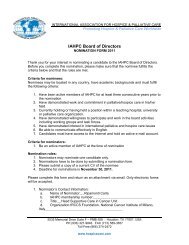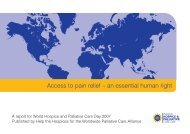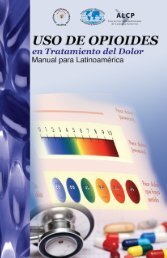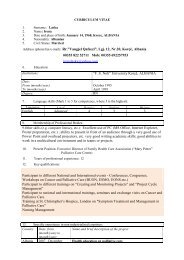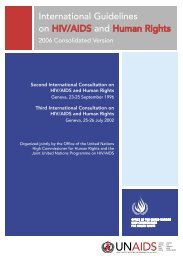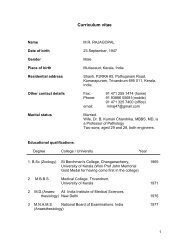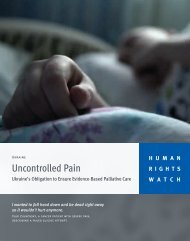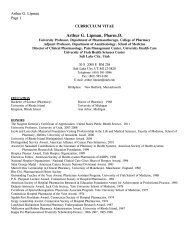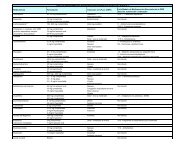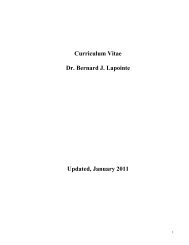INTERIGHTS Bulletin
INTERIGHTS Bulletin
INTERIGHTS Bulletin
You also want an ePaper? Increase the reach of your titles
YUMPU automatically turns print PDFs into web optimized ePapers that Google loves.
182<br />
<strong>INTERIGHTS</strong> <strong>Bulletin</strong><br />
Volume 16 Number 4 2011<br />
International<br />
Law Reports<br />
Argentina is to provide information to the HRC about<br />
the measures taken to give effect to the HRC’s views.<br />
WOMEN; LIFE; HEALTH<br />
Violation of Article 3 – prohibition of torture or<br />
inhuman or degrading treatment (substantive aspect)<br />
and Article 8 – right to respect for private and family<br />
life – of the ECHR<br />
R.R. v Poland<br />
Application no. 27617/04, Judgment of the ECtHR, 26<br />
May 2011<br />
During the 18th week of her pregnancy, RR underwent<br />
an ultrasound scan which indicated that her foetus may<br />
have been affected with an undetermined malformation.<br />
RR was informed that genetic testing was required to<br />
confirm this diagnosis. RR told her physician that she<br />
wanted to undergo genetic testing, and that she wished<br />
to have an abortion if the foetus was in fact malformed.<br />
Abortion in Poland is available only in limited<br />
circumstances, including when prenatal tests indicate a<br />
high risk that the foetus will be severely and irreversibly<br />
damaged.<br />
Over the next several weeks, RR persistently sought to<br />
undergo genetic testing, seeking the procedure from<br />
various doctors, hospitals and clinics, only to be denied<br />
for various purported reasons. Six weeks after the<br />
ultrasound which gave rise to the concerns about the<br />
foetus, RR was finally able to obtain the genetic testing,<br />
the results of which indicated that her foetus was<br />
affected by Turner syndrome, a chromosomal<br />
abnormality. However, RR was unable to obtain an<br />
abortion at that time, as Polish law prohibited a woman<br />
from obtaining an abortion under the given<br />
circumstances after the 22nd week of pregnancy. RR<br />
subsequently gave birth to a daughter affected with<br />
Turner syndrome. RR initiated legal proceedings in the<br />
Polish courts, which resulted in her being awarded<br />
monetary damages pursuant to a final judgment. During<br />
these proceedings, RR rejected a settlement proposal by<br />
the Government.<br />
RR applied to the ECtHR, complaining that her doctors’<br />
intentional failure to provide timely prenatal testing, as<br />
well as the dismissive and contemptuous manner in<br />
which the medical professionals communicated with her<br />
during her ordeal, gave rise to a violation of Article 3 of<br />
the ECHR. RR further complained that the failure of the<br />
Government to implement regulations governing access<br />
to prenatal examinations, abortions and the exercise of<br />
conscientious objections by medical professionals gave<br />
rise to a violation of Article 8 of the ECHR. Finally, RR<br />
submitted that the Government’s failure to create a legal<br />
mechanism for her to challenge her doctors’ decisions<br />
concerning access to prenatal examinations constituted a<br />
violation of Article 13 of the ECHR.<br />
As a threshold issue, the Government argued that RR<br />
had lost her status as a victim of a breach of her rights<br />
under the ECHR by rejecting the Government’s<br />
settlement proposal and by receiving a monetary award<br />
from the Polish courts. The Government submitted that<br />
the manner in which RR had been treated by the various<br />
medical professionals did not rise to the level of a breach<br />
of Article 3. In addition, the Government took the<br />
position that Turner syndrome did not rise to the level of<br />
severe and irreversible damage that would permit RR to<br />
seek a lawful abortion, thus the delay in genetic testing<br />
did not result in any denial of RR’s right to a lawful<br />
abortion under Polish law. Finally, the Government<br />
argued that Polish law provided for adequate procedures<br />
governing the taking of medical decisions concerning<br />
abortion on medical grounds and thus there had been no<br />
breach under Article 13.<br />
The Court held that: (1) RR’s refusal to settle the case has<br />
no affect on her victim status under the ECHR; (2) the<br />
award by the Polish courts was insufficient financial<br />
redress and did not result in her losing her status as a<br />
victim under the ECHR; (3) RR’s suffering reached the<br />
minimum threshold necessary to result in a breach of<br />
Article 3; (4) the Government’s failure to create a<br />
procedural framework enabling a pregnant woman to<br />
exercise her right of access to lawful abortion (including<br />
access to information on her foetus’ health to determine<br />
whether an abortion is legally available) is a breach under<br />
Article 8; (5) RR’s complaint regarding the breach of<br />
Article 13 overlaps with the issues the Court examined<br />
under Article 8, therefore it is not necessary to examine<br />
separately whether there has been a violation of Article<br />
13; (6) the Government must pay RR EUR 45,000 for<br />
non-pecuniary damages and EUR 15,000 for costs.



